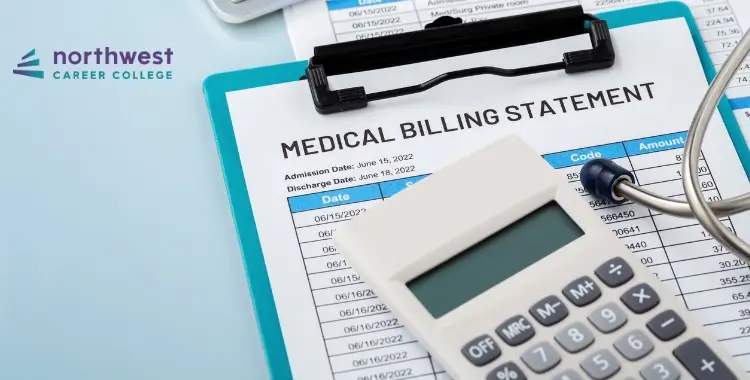Medical Coders and Billers – The Scope and Importance Of Training
- Medical Billing and Coding
- March 5, 2025
- 4.2k views
- 6 min read

Medical billing and coding are vital parts of the healthcare industry. Without trained medical coders and billers, the industry would grind to a halt, meaning medical billing and coding students need quality training to succeed in this field. This blog post will explore the scope and importance of training for medical coders and billers.
The medical coder and biller is responsible for translating the physician’s diagnosis into a code used by insurance companies to reimburse the provider.
Table of Contents
- The medical coding and billing system is critical in the healthcare industry. This dual profession is responsible for accurately translating a physician’s diagnosis into a code insurance companies use to reimburse the provider.
- They must be able to understand and apply the coding guidelines set forth by the Centers for Medicare and Medicaid Services (CMS). Healthcare coding professionals have an important responsibility in the medical industry. They must be able to understand and apply the coding guidelines set forth by the Centers for Medicare and Medicaid Services (CMS).
- In order to become a certified medical coder or biller, one must complete an accredited training program and pass a certification exam.
- The scope of work for medical coders and billers has expanded in recent years due to the implementation of the Affordable Care Act (ACA).
- As a result of this expansion, there is an increased demand for trained professionals in this field.
- Join a rapidly growing and vital job field
- Become a vital part of the healthcare cycle
The medical coding and billing system is critical in the healthcare industry. This dual profession is responsible for accurately translating a physician’s diagnosis into a code insurance companies use to reimburse the provider.
But medical coders and billers do much more than just read up on medical terminology.
They must also be familiar with the various codes used by each insurer, details regarding eligibility for coverage, rules for obtaining pre-authorization for certain procedures, and even understand the nuances of legal policies such as HIPAA and privacy regulations.
Additionally, they must stay up-to-date on changes within the industry in order to accurately reflect recent treatments and medications in their work. Becoming a certified medical coder requires specialized training, testing, and dedication to detail – including keeping abreast of any relevant regulation or law changes that may have implications on coding decisions.
By diligently performing these duties while staying within ethical guidelines, they make sure that patients are receiving appropriate reimbursement while preserving privacy rights and protections. In essence, they are an integral part of ensuring patient care remains both successful and compliant.
They must be able to understand and apply the coding guidelines set forth by the Centers for Medicare and Medicaid Services (CMS). Healthcare coding professionals have an important responsibility in the medical industry. They must be able to understand and apply the coding guidelines set forth by the Centers for Medicare and Medicaid Services (CMS).
CMS is responsible for establishing national standards, setting codes to identify diagnoses and procedures, and creating code sets that are used throughout the healthcare system. Healthcare coders must be familiar with this information to document diagnoses, treatments, services, and procedures accurately.
If not properly documented, billing could potentially be delayed or denied resulting in financial losses for medical practices. It is, therefore, critical for healthcare coders to understand CMS coding guidelines and abide by them when entering information into a patient’s medical record.
In order to become a certified medical coder or biller, one must complete an accredited training program and pass a certification exam.
Becoming a certified medical coder or biller can be a great career choice for those looking to work in healthcare. To obtain certification, individuals must complete an accredited program that covers various coding and billing systems, as well as the legal and ethical considerations specific to the industry.
Typically, programs include instruction on anatomy, physiology, medical terminology, reimbursement strategies, and claims processing. Once the training is complete, prospective coders and billers must pass a comprehensive certification examination.
This exam is administered by recognized certifying bodies such as the American Health Information Management Association (AHIMA) or the Board of Medical Specialty Coding & Compliance (BMSC).
Both of these organizations offer high standards of excellence backed by extensive research so that newly-certified professionals meet stringent requirements for professional knowledge and competency.

The scope of work for medical coders and billers has expanded in recent years due to the implementation of the Affordable Care Act (ACA).
In the medical billing and coding industry, there has been a significant shift in recent years due to the implementation of the Affordable Care Act (ACA).
For example, medical billers and coders are now expected to be knowledgeable about relevant regulations concerning access, cost-sharing and coverage. In addition, they must ensure that their practice complies with federal standards for patient privacy and data security.
Moreover, they need to stay up-to-date on ICD-10 codes and other precise manual coding systems used by insurance companies. One area that has expanded greatly for medical coders is auditing because an increase in fraudulent activities related to healthcare payments has resulted in greater scrutiny for these professionals.
Ever-changing requirements have presented new challenges when it comes to claims management. As such, medical billers and coders must be adaptive and proactive to not only meet ACA standards but also remain competitive in this growing field.
As a result of this expansion, there is an increased demand for trained professionals in this field.
As medical technology advances, there is an increased need for more medical professionals to document and store medical data. This includes filing medical records into proper databases and tracking claims through both private and government insurance companies.
Due to this growth, there is now an increased demand for trained professionals in this field. While medical coding does not require a college degree, having proper training can set someone apart from other job candidates when looking for solid job opportunities in the medical coding industry.
With the right training, numerous positions are available in various settings, such as hospitals, clinics, nursing homes, home health agencies, and physician offices. A rewarding career awaits those who have the skill set to meet the increasing demand for medical billers and coders across the United States.
By spending just a few months completing training courses at an accredited medical billing school or through online medical coding classes, they can soon be the certified medical coder that employers are searching for today.
With numerous job opportunities available due to the expansion of medical technology, you could make a difference while also entering into an essential career with good pay and one that promises to enjoy huge job growth during the next decade.
Join a rapidly growing and vital job field
The scope of work for medical coders and billers has expanded in recent years due to the implementation of the Affordable Care Act (ACA). As a result of this expansion, there is an increased demand for trained professionals in this field.
Contact Northwest Career College today to discuss our Medical Billing and Coding Program and how it can help you make a difference in the medical industry. With our experienced instructors, comprehensive curriculum, and career placement assistance, we have the tools to help you succeed in this exciting field.
Become a vital part of the healthcare cycle
Taken together, medical coding and billing form a link between patients, healthcare providers, and insurance companies. As a medical biller or coder, you’ll need to be accurate, detail-oriented, and well-organized as you’ll be a vital part of any healthcare provider’s staff.
As one of the premier Medical Billing and Coding Schools in Las Vegas, Northwest Career College employs established, seasoned instructors to teach you every aspect of medical billing and coding.
Our student-focused approach puts you first, and we offer online and on-campus workshops to accommodate your work and family schedule.
We continue to support our students after they graduate as our experienced Career Services team works with you to help you find medical billing and coding jobs in Las Vegas. Call us today at (702) 403-1592 to learn more about the exciting opportunities that our Medical Billing and Coding School can offer you!



